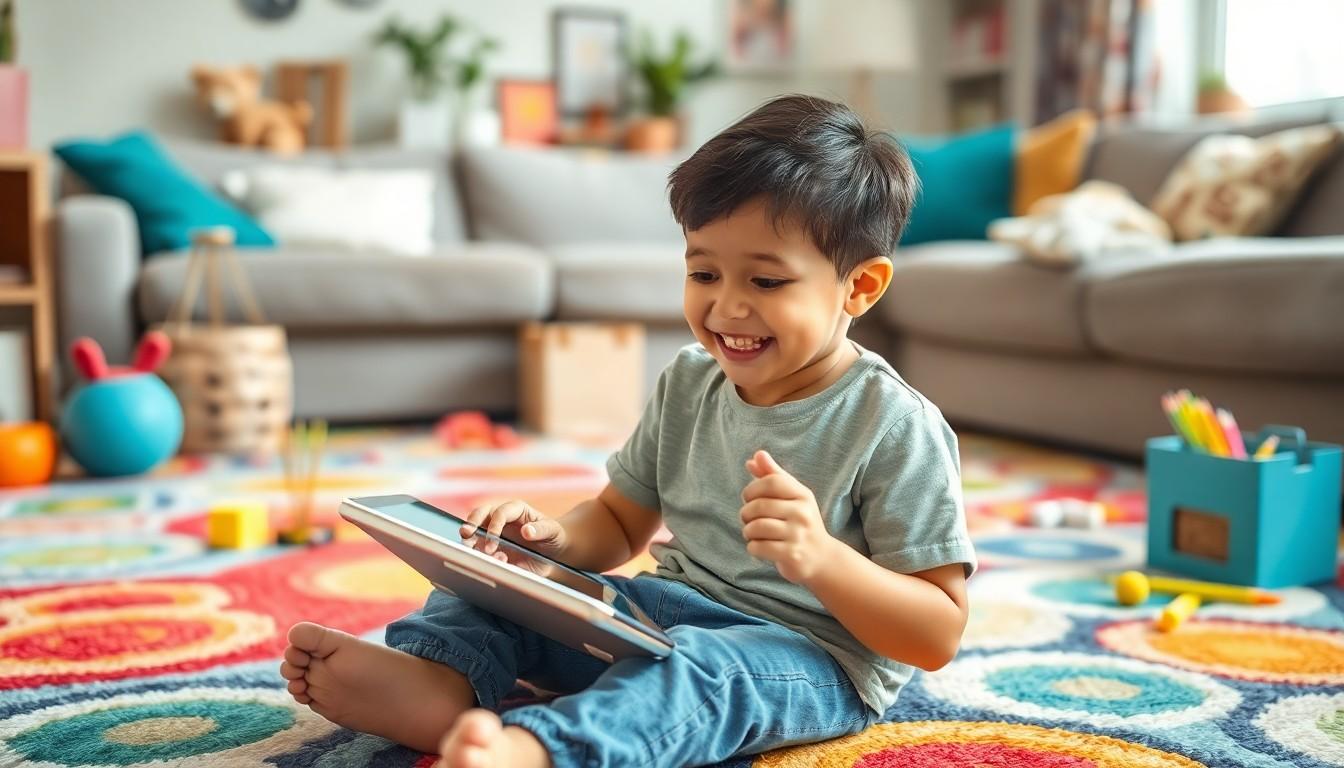Table of Contents
ToggleIn a world where kids juggle school, friendships, and the occasional existential crisis, mental health apps are stepping in like superheroes in capes—only with fewer spandex suits. These digital tools offer a fun and engaging way for children to understand their feelings and cope with life’s little hiccups. With colorful graphics and interactive features, they make tackling mental health as appealing as a video game.
Overview of Mental Health Apps for Kids
Mental health apps specifically designed for kids offer a variety of features to support emotional well-being. These applications often include games, activities, and resources tailored to engage young users. By incorporating colorful graphics and interactive elements, they attract children’s attention, making mental health management enjoyable.
Various mental health apps provide tools to help kids recognize and express their emotions effectively. Apps like “Mood Meter” offer insights into feelings, prompting children to identify their moods and understand their triggers. Another app, “Headspace for Kids,” introduces mindfulness and meditation in a fun way, teaching relaxation techniques that kids can use daily.
Many apps also encourage journaling, allowing kids to document their thoughts and experiences. Tools such as “My Wonderful Days” promote positive thinking and gratitude, fostering emotional resilience. Other features include breathing exercises and calming sounds, which can guide children during stressful moments.
Parents can monitor their child’s progress with many apps, gaining insights into emotional patterns and growth areas. Through this connection, families can foster healthier conversations around feelings. The involvement of caregivers and educators enhances the overall effectiveness of these mental health apps.
Access to a wide range of mental health resources is crucial for all kids. These apps not only support emotional development but also cultivate coping skills that children can use throughout their lives. In the face of various challenges, mental health apps tailored for kids serve as vital tools in building emotional intelligence and resilience.
Benefits of Using Mental Health Apps
Mental health apps provide essential support for kids, making emotional well-being more accessible. They offer a range of benefits that enhance mental health management.
Accessibility and Convenience
Accessibility stands out as a key benefit. Kids can use these apps anytime and anywhere, making emotional support readily available. Convenience enables children to engage with mental health resources independently. Many apps are designed with simple interfaces, promoting ease of use. Parents also appreciate being able to track progress through these platforms. Real-time data insights help families understand emotional trends, fostering open discussions at home. Users can quickly access coping strategies and mindfulness exercises, allowing for immediate relief during stressful moments.
Engaging Learning Tools
Engagement plays a crucial role in learning about mental health. Apps utilize bright colors and interactive features to attract kids’ attention. These engaging tools turn complex concepts into enjoyable activities. For instance, games and quizzes introduce emotional vocabulary, simplifying understanding. Daily challenges encourage regular practice of coping techniques, reinforcing learning in a fun way. Many apps offer storytelling features that resonate with children’s experiences, making lessons relatable. By incorporating these strategies, children develop emotional resilience while enjoying a playful approach to serious topics.
Popular Mental Health Apps for Kids
Several mental health apps specifically designed for kids provide valuable support, helping them navigate their emotions and challenges effectively.
App A: Features and Benefits
Mood Meter offers a vibrant platform for children to identify and express their feelings. It utilizes color-coded emotions to help kids recognize their moods throughout the day. Engaging activities encourage emotional awareness and promote discussions about feelings with parents or caregivers. Features include daily check-ins and visual mood tracking, allowing children to reflect on their emotional states over time. The app not only enhances emotional literacy but also contributes to resilience by helping children articulate their experiences.
App B: Features and Benefits
Headspace for Kids introduces mindfulness through age-appropriate guided meditations. Tailored sessions teach relaxation techniques and coping strategies for stress and anxiety. Users can choose from various topics, including focus, sleep, and calming exercises. With interactive features like animations and characters, it captivates children’s attention while promoting healthy mental habits. The fun and engaging environment fosters regular use, helping children develop a consistent mindfulness practice.
App C: Features and Benefits
Breathe, Think, Do with Sesame is designed to teach children problem-solving and emotional regulation. The app engages users with fun animations and relatable scenarios. It encourages kids to breathe deeply, think through their feelings, and formulate solutions to challenges they encounter. By focusing on social-emotional learning, it builds resilience and promotes cognitive development. Parents appreciate the structured activities that can be integrated into everyday life, creating opportunities for family discussions around emotions.
Considerations When Choosing an App
Selecting the right mental health app for kids involves several important factors. Parents and caregivers should assess age appropriateness and privacy and security to ensure a positive experience.
Age Appropriateness
Age-appropriate content ensures children can engage meaningfully with mental health apps. Apps designed for younger kids offer simpler language and visuals, while those for older children may include more complex concepts. It’s crucial to select apps that align with a child’s developmental stage. For instance, “Mood Meter” is suitable for various ages, while “Headspace for Kids” targets specific age groups, tailoring meditation techniques accordingly. Whenever possible, read reviews and descriptions to determine content suitability. Engaging children through relatable materials enhances their comprehension and emotional connection.
Privacy and Security
Privacy and security play vital roles in the effectiveness of mental health apps. Parents should prioritize apps with strong data protection policies and clear privacy practices. Relevant details should include information on what user data is collected and how it is used. Apps like “Mindful Powers” emphasize secure login options and data encryption features, establishing trust with families. Consider apps that do not share personal information with third parties, ensuring children’s safety during usage. Assessing privacy settings enhances confidence in the app, allowing kids to explore mental health tools securely.
Conclusion
Mental health apps for kids offer innovative ways to support emotional well-being in a fun and engaging manner. By utilizing colorful graphics and interactive features, these tools help children understand their feelings and develop coping strategies. With a variety of options available, parents can find apps that suit their child’s needs while ensuring safety and privacy.
As kids navigate life’s challenges, these apps not only enhance emotional literacy but also foster resilience and cognitive growth. By integrating mental health practices into daily routines, children can build a strong foundation for their emotional health. Choosing the right app can make all the difference, empowering kids to take charge of their mental well-being in a secure and enjoyable way.





